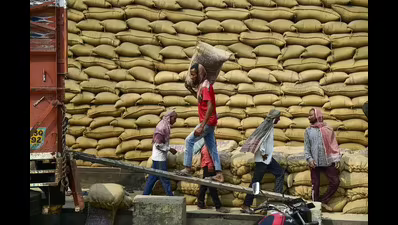Tags
“Beyond paddy hybrids: Basmati may just be the answer for farmers in Punjab”

Chandigarh: Basmati could emerge as a viable alternative following the recent ban on hybrid and Pusa 44 paddy varieties, despite the potential short-term challenges for farmers and seed vendors. Improved market prices in some areas might help offset farmers’ concerns about the fluctuating basmati prices experienced over the last few years.
Last year, the Punjab govt had imposed a ban on sale of hybrid paddy seeds due to lower rice recovery and poor milling recovery. The hybrid varieties of paddy, besides Pusa 44, gained popularity among farmers because of their early maturity and other short-term benefits. Originally allowed in the early 2000s due to wet conditions in parts of Muktsar, Malout, and Gidderbaha, the use of these seeds eventually spread across Punjab, especially Gurdaspur and Amritsar in the Majha region and Jalandhar and Hoshiarpur in Doaba.
Meanwhile, in 2023-24, Punjab produced 26 lakh tonnes of basmati, which increased to 32 lakh tonnes in 2024-25. Due to international demand, 1121 paddy is being sold at Rs 5,000 per quintal in some areas.
Ranjit Singh Jossan, vice-president, Basmati Rice Miller and Exporter Association, said with the ban on hybrid varieties and Pusa 44, basmati rice had become a viable and sustainable option. He highlighted that basmati not only consumed significantly less water, but also fetched premium prices in both domestic and international markets.
Jossan noted that basmati varieties like 1121, 1885, 1509, 1718, and 1401 were in high global demand and Punjab boasted of a strong marketing structure for basmati.
“In 2023-24, Punjab produced 26 lakh tonnes of basmati, which increased to 32 lakh tonnes in 2024-25. Currently, due to strong international demand, 1121 paddy is being sold at a rate of Rs 5,000 per quintal. Looking ahead, rising demand suggests that farmers can expect even better prices. The state govt should now focus on spreading awareness among farmers and encouraging them to transition to basmati cultivation with proper guidance, seed quality control, and export support,” he said.
Last year, the state govt targeted a 40% increase in basmati paddy cultivation. This year, it is targeting 10 lakh hectares — a significant jump from 5.96 lakh hectares in 2023, with the state pushing for Direct Seeding of Rice (DSR) on one lakh hectare of the targeted basmati area.
Basmati growers are also eligible to adopt the DSR technique and avail themselves of a financial incentive of Rs 1,500 per acre. Farmers in the basmati belt of Pathankot, Gurdaspur, Amritsar, and Tarn Taran have shown interest in adopting DSR for the PUSA 1509 variety.
https://timesofindia.indiatimes.com/city/chandigarh/beyond-paddy-hybrids-basmati-may-just-be-the-answer-for-farmers-in-punjab/articleshow/121700205.cmsPublished Date: June 9, 2025






